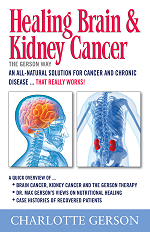| |
Archived from
Charlotte Gerson's booklet

Story
In
October of 1990, in his 58th year, David was diagnosed with
kidney cancer that had spread to both kidneys. He had originally
gone to his urologist because an enlarged prostate was causing some
problems with urination. While being initially treated for this condition,
he was also given an LV.P. (Intravenous Pyelogram) test for
visualizing kidneys. This test revealed "a depression, like something
was pressing on his kidney." To check further, a CAT scan was done.
Nothing showed outside of his kidneys. However multiple tumors
were visible in both kidneys: five or six in the right kidney, and three
in the left. A needle biopsy done on the largest tumor tested positive
for a fast-moving malignancy.
The doctor told David that the tumors could not be removed
because they were too close to the major blood supply to the kidneys.
"This is the worst possible scenario I can imagine," he said, and
proposed a swift entire removal of both kidneys. This operation of
course would have required David to receive regular dialysis for the
rest of his life. When David refused to undergo this surgery, another
doctor sent him to UCLA to see about entering an experimental
program using interferon. However, the UCLA oncologist wouldn't
allow David to participate in this trial. There was a chance, he
declared, that David's cancerous condition was "curable" if both his
kidneys were removed.
At this point, David was sent back to his surgeon/urologist for the
dual nephrectomy. When David asked about the possibility of
receiving a kidney transplant, he was told that this would be impossible.
The immunosuppressive drugs he would have to take to prevent
his body from rejecting the donated kidney almost certainly would
cause his cancer to recur. David was also informed that if he
attempted to try some nutritional treatment first, which he was now
considering doing, it probably would be too late to do surgery since
the cancer doubtless would spread. Nevertheless, David again refused
to have his kidneys removed.
Instead, in January of 1991, David came to the Gerson Therapy
hospital in Mexico. After checking in, his first urinalysis, showed a
slight amount of blood in his urine. None showed in any of his
subsequent tests.
When returning home after some three weeks, David maintained
the strict therapy for two years, and then continued on a less intensive
treatment. Six years later, his regimen was reduced to four carrot
juices and one green juice daily, and a coffee enema every other day.
He still does the castor oil treatment every other month.
Since kidney cancer tends to spread to the lungs, some months ago
David had lung X-rays taken; his lungs showed clear. He has blood
tests and urinalyses done regularly. David reported that his doctor
commented, "I never see blood tests this good, they are better than
my own."
Surprisingly, tumors still show in David's kidneys when they are
scanned. At the time of his diagnosis and biopsy, in 1990, these were
described as fast-growing malignancies. But since the tumors remain
unchanged and no other cancer has appeared in his body for the past
11 years, it is fairly safe to assume that the tumors are either calcified
and virtually dead, or else encapsulated. If they were active, they
would be growing and/or spreading.
Last report: October 2001. At that time, David Saracoff was close
to his 69th birthday. He was currently in good health, had fair energy,
his weight was steady, his appetite and sleep normal. He was pain free.
"I am fairly active," he said. "I bought a motor home and took a
trip back East for seven weeks. And I also went camping."

|
|
